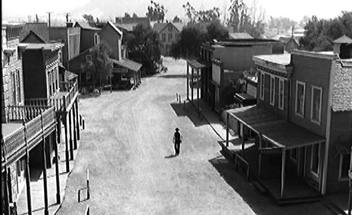|
|
AFInity: High NoonBy Kim HollisOctober 16, 2009
The movie contains a number of subtle touches that help it to effectively impart its themes and ideas. I mentioned that "Do Not Forsake Me..." plays at the beginning of the film, and the song returns again and again to great effect. Clocks are displayed as the scenes unfold, so we consistently know exactly how long Kane has before the hour of reckoning (there's also a clock-like sound that will sometimes play, heightening the tension). And then there's the finale, where a fantastic tracking shot pulls out to show Kane all alone in the town, looking at the landscape. Everything is very consciously crafted to add to the notion that he's been abandoned. In a Playboy interview in 1971, John Wayne called High Noon "the most un-American thing I've ever seen in my life," and I can see why a movie where people behave in such a gutless manner might be troublesome to a man who was accustomed to representing the best that his nation had to offer. The thing is, humans don't always rise to the occasion the way you might want them to. Sometimes, there might be legitimate reasons for their failure to be heroic (they have family to care for; they object on religious grounds; they actually kind of like the bad guy), but it's a much more realistic proposition to assume that a man like Kane would find few offers of assistance than to believe the town would rally around him without hesitation. Clearly, there's room for only one hero in Hadleyberg; the only question is whether he'll prevail. As I mentioned, High Noon is 57-years-old, but it still feels quite relevant and effective in the 21st century. The themes of isolation and cowardice are as impactful and engaging today as I'm sure they were in 1952. Once again, as we've seen with many of the AFI films, we also have a character who seems to have watched time - and the world - pass him by. Kane once had a place in a rugged old town that needed a watchful protector, but now he's a man alone. People are more accepting of the slip in values - with some of the townsfolk even commenting that they like it better when Miller and his cronies are in town. Kane's struggle to reconcile his position in this new society is a poignant piece of the film. I have no problem understanding how High Noon would place so prominently on the AFI's 100 Years... 100 Movies list and their top westerns. It's a movie I'm sure I could watch again and find something new to appreciate each time. The movie is quickly paced and tells a story of a man struggling to do the right thing even though he has no support. I'd argue with John Wayne and say that High Noon is singularly American in that regard. It's a great standard bearer for the western genre. Kim's AFInity Project Big Board
|

|
|
|

|
Thursday, April 25, 2024
© 2024 Box Office Prophets, a division of One Of Us, Inc.


